Month: December 2022
Transformative Stories of 2022!
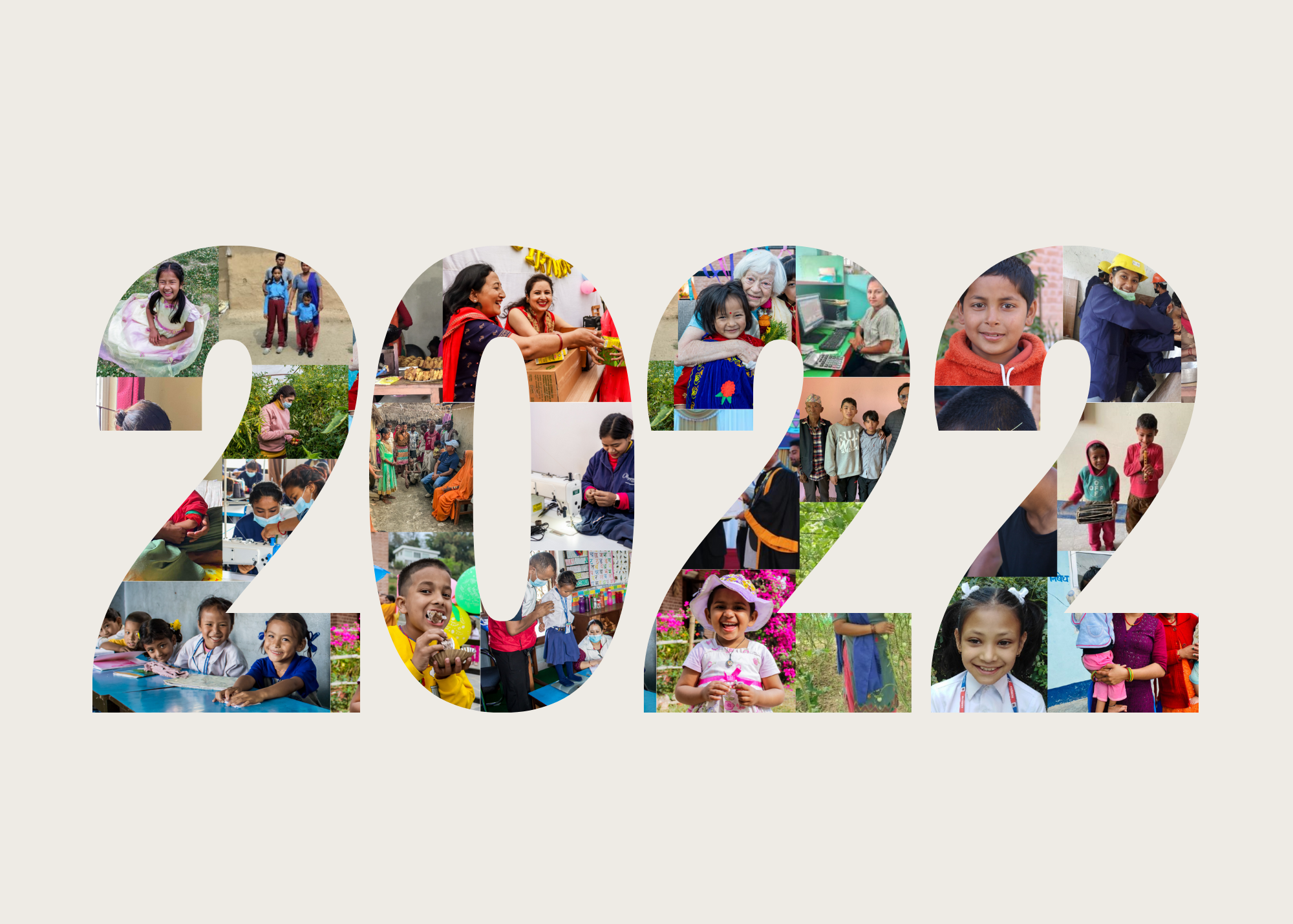
This December, we’ve compiled some of our favorite transformative stories of the year into this blog post. You may have already even read a couple of them in a newsletter, online, or in a special report. But we wanted to create a space to celebrate these special stories that our NYF Community made possible this year.
We hope these transformative stories showcase NYF’s love, care, and commitment for the youth and families we work with. And we also hope you feel proud of all the transformations you are fueling every day with your generous support.
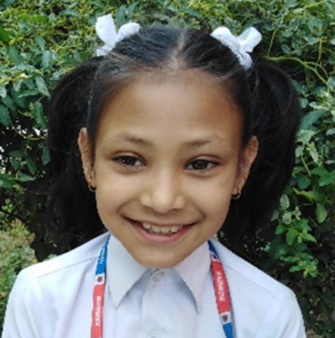
Mina
Mina*, 9, is a bubbly, joyful, creative kid—and a very gifted student. In the spring of 2022, she finished the 6th grade at her school in Bhaktapur District, way ahead of kids her own age.
When she was just a baby, Mina’s father passed away. Soon, her mother found a new husband. Unfortunately, this new man wasn’t interested in caring for another man’s daughter.
Mina’s mother left her in the care of her own father—Mina’s grandfather. Mina hasn’t seen much of her mother since.
Though the family didn’t have much, they loved Mina deeply. She brings tremendous joy to their household. When NYF learned of Mina’s case, our team realized right away that with a bit of financial support, this family was the absolute best place for little Mina to grow up.
They’ve been receiving a Kinship Care stipend for several years now. Every time our social workers check in, Mina’s grandfather is ready with more stories of his granddaughter’s love of dancing and her latest art projects!

“No one does it better. NYF combines
care, compassion and enormous commitment
to raising opportunities for Nepal’s youth.”
— Marcus, Advisory Board Member & Supporter

Durgesh
Scholarships for Students with Disabilities
Durgesh*, 18, comes from a very remote Himalayan village in northwestern Nepal, where the geography is quite rocky and challenging to navigate. The children in his home village walk about 45 minutes to reach their local school. The path is treacherous, with slippery sections, sharp drop-offs, and thin stretches that people have to be take single-file.
Durgesh was born with a significant visual impairment, and his parents realized early that many livelihood opportunities available in their village would not be a good match for him when he became an adult. The family was far from wealthy, but they worked hard and made personal sacrifices from the beginning to ensure he could access as many educational opportunities as possible.
When Durgesh was a small child, older village children would take turns carrying him on their backs on the way to school. This ensured that he could reach school safely, and he quickly distinguished himself as an excellent student (and a helpful friend who could provide informal tutoring to his peers when needed!).
But by the time Durgesh reached his mid-teens, he was too big to be carried along the dangerous trail by his friends. It was also too risky, and careful attempts at having him walk side-by-side with friends were too slow. That’s when a family friend who was already attending college in Kathmandu made a brilliant offer: Durgesh should move to Kathmandu, where schools were easier to access (and of a better quality!). This friend would share his apartment and ensure Durgesh was doing well in the city. Durgesh’s parents would send money for food, rent, and other necessities.
This plan worked—until the COVID-19 pandemic complicated matters. Durgesh’s parents were unable to send as much money as needed. School fees were free for Durgesh (as a student with a disability), but he was struggling to pay his portion of the rent and for the special books and stationery he needed for school.
Fortunately, NYF had worked with Durgesh’s school in the past, and the administration remembered that NYF offered special scholarships for students like Durgesh.
They referred Durgesh for our Students with Disabilities scholarship in January 2021 and has been going strong in school ever since!
Durgesh was one of the top 5 students in his grade 11 final exam a year ago, and he has recently completed his rigorous grade 12 exam. His studies during 11th and 12th grade focused on Humanities, and Durgesh is excited about the prospect of college. We’re excited for him, too, and we are eager to support him in the next chapter of his academic journey!

“We have donated to this foundation for well over 10 years,
and they continue to provide care and service
that no one else provides.”
— Liz, Donor
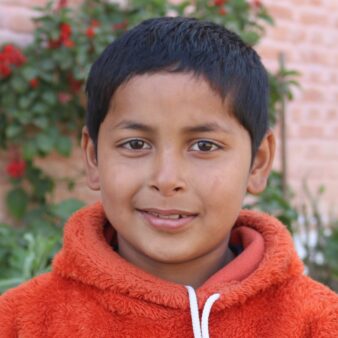
Pradeep
Pradeep*, 12, was born in Gorkha District, northwest of Kathmandu. He joined the Olgapuri family in December 2021, enrolling in the 4th grade at a local school in Lalitpur midway through the school year.
When Pradeep’s grades began coming back, his house parents noticed that he seemed to be struggling a great deal with the material. Concerned, the Junior Boys’ house parents met with Pradeep’s teacher to discuss his progress.
It became clear to everyone that Pradeep should have been placed in the 3rd grade, not the 4th, when he first arrived.
How could such an error happen? Although he had always been enrolled in school before coming to Olgapuri, Pradeep wasn’t always able to attend his classes. No wonder Pradeep was so discouraged!
They decided to hold Pradeep back to attend the 4th grade again next year. And by the end of the summer, Pradeep was ready to start the 4th grade from the beginning. He’s still getting familiar to school—but his performance is improving all the time. He’s also feeling much happier with school in general.
Even better: he has made wonderful new friends who are willing to help him succeed, and he knows his house parents are truly paying attention to his needs and his wellness. Here at Olgapuri, even when things are tough, Pradeep knows he is part of a loving family he can depend on.

“I’ve been fortunate to visit the different facilities and
programs in Kathmandu, and it is eye opening
to see all the lives that are touched and the scale of the impact.”
— Topraj, Advisory Board Member & Supporter
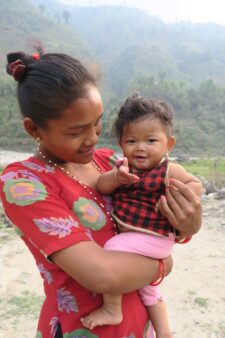
Puja and Sangita
Nutrition Outreach Camp, Nutritional Rehabilitation Home
Six-month-old Puja* is 17-year-old Sangita* and her young husband Laxman’s* first child. When an anxious Laxman brought his family to an NYF Nutritional Outreach Camp in Makwanpur District four months ago, Sangita and Puja were both severely undernourished.
“Everyone thought she was going to die,” Sangita says. Child marriage is very common in Sangita’s community, often between boys and girls who are each quite young. Young mothers like Sangita frequently give birth prematurely, to babies with low birth weights.
If these mothers are also experiencing undernutrition, their bodies can’t provide sufficient breast milk, and young parents in these remote communities often don’t know alternative ways to nourish their babies.
As a result, many first-time mothers—still children themselves—face the heartbreak of a child’s death.
Sangita and Puja were urgently referred to the nearest Nutritional Rehabilitation Home, where they received personalized nutritional therapy for over a month. Laxman came as well, eager to learn what he could about nutrition and health, and preparing nutritious meals for children with low-cost, locally-available ingredients.
Between lessons, the pair also received family planning advice from nurses, including information on the risks of having children too quickly. These tips will be crucial for preserving Sangita’s health moving forward. The shared learning experience drew the young couple closer together—and put Puja on a path of healthy growth and development.
“Nobody recognized our daughter when we brought her home,” Sangita said proudly at their three-month follow-up visit. NYF’s Outreach Officer, Sajan Nagarkoti, was overjoyed to see how much Puja had continued to grow, and how much healthier both she and her mother looked.

“I have been continually impressed with the
creativity, flexibility, and commitment to children
shown by this organization. I heartily support them
and urge others to consider supporting them.”
— Bob, Donor & Volunteer
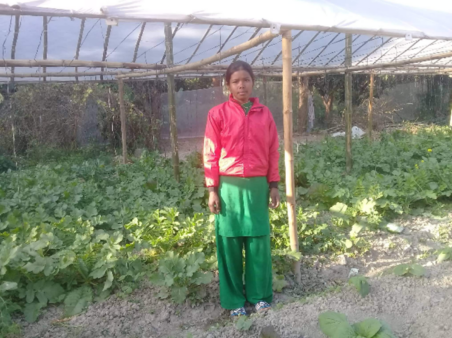
Rita
SAAET Project, Vocational Education
Rita*, 17, lives in a family of 8. They have a small farm on which they’ve been subsistence farming for Rita’s whole childhood. Feeding such a large family is difficult, so her parents were eager to find her a husband soon. But that’s not what Rita wanted.
She learned about the SAAET course from a local women’s group and signed up.
After the training session ended in early October, Rita was the first student to complete her own greenhouse and get her first seeds in the ground—with the help of some of her siblings!
Rita says she’s excited to start farming using modern technology. The whole family is enthusiastic about what Rita has learned. They’re waiting to see how this first greenhouse does, but they’re already talking about gradually shifting their entire approach to greenhouse farming, following Rita’s lead.
If Rita does eventually get married, she’ll be leaving her current greenhouses behind on her parents’ land—but she’ll carry the expertise with her. She is now in much greater control of her path in life, wherever it leads her: her parents are less likely to try forcing a marriage, and if she chooses a partner in the future, his family is less likely to object. She would enter such a union carrying valuable expertise that would give her greater security, stability, and clout in the new family system, allowing her to nourish herself and her future children with confidence—as well as the ability to invest in their future.
Support from friends like you make these transformations possible. We hope you enjoyed reading some of NYF’s transformative stories from 2022.
World Cup Qatar 2022: The Need for Vocational Training in Nepal

World Cup Qatar 2022 is the first World Cup to be held in the Middle East—and only the second to be held entirely in Asia. This global sports tournament should be a time of great celebration and unity.
Unfortunately, as fans across the world tune in to cheer for their favorite teams, a much less joyful story has come to light. That story is about the thousands of migrant workers from places like India, Pakistan, Bangladesh, and Nepal who built the World Cup 2022 stadiums and other infrastructure necessary for Qatar to host this massive event.
These migrant workers have recounted stories of horrific working and living conditions—and many have died. (We have compiled a list of news stories below.)
Most of the stories we’re seeing published in the west place the blame on Qatar—as though without the World Cup, these migrant workers would never have been in such a situation.
Unfortunately, the truth is that the World Cup has only shined a light on a long-term, widespread problem impacting these communities.
Youth underemployment in Nepal hovers around 35%, with many young people unable to access the skills training or other resources necessary to make a living in their own communities. Many of these young people have no choice but to take migrant labor jobs abroad, sending money home to their families as often as they can.
Conditions for these workers are brutal: long hours performing dangerous, back-breaking work for low wages. Many report that their passports are kept by their employers, preventing them from returning home on their own if they wish. Health care options are effectively non-existent. Unfortunately, many Nepalis in this situation pass away or become seriously injured—and their selfless efforts to create a better life for their children leave them worse-off than when they began. The death toll among migrant workers from Nepal has been steadily increasing for years—and the majority of these deaths are not happening in Qatar.
This has been the reality for millions of Nepali young people long before Qatar began designing their World Cup stadiums. And it will continue after the World Cup has ended.
At NYF, we believe that the best way to end this cycle isn’t by focusing on conditions in Qatar and other countries that rely on migrant labor. Rather, it’s by creating better working opportunities at home in Nepal (and other home countries!).
This approach allows individual young people to access lucrative careers close to home, creating opportunities for economic and infrastructure growth in their own communities. NYF’s Vocational Education & Career Counseling programs and Olgapuri Vocational School were designed to provide exactly this kind of alternative for young Nepalis.
Here are just a few stories that illustrate the impact of these programs!
Sustainable Agricultural and Entrepreneurship Training
Kalpana got married soon after she was freed from kamlari bondage. She settled with her husband’s family on their small plot of rented land. They have five children, and were eager to give them the best opportunities possible.
Her husband considered taking a job overseas to make extra money, but he and Kalpana were both anxious about this option. When Kalpana heard about NYF’s one-month SAAET Project, she signed up right away, participating in the November 2021 course.
Immediately after the training, in December, she enlisted her husband to help her construct their first greenhouse. They started planting off-season vegetables on their land, and success was immediate.
Kalpana is now growing highly marketable tomatoes, bitter gourd, cucumbers, pumpkins, and cauliflower. She is currently making a profit of 20,000 Nepali rupees per month (minimum wage in Nepal is 13,450 rupees per month, or $115).
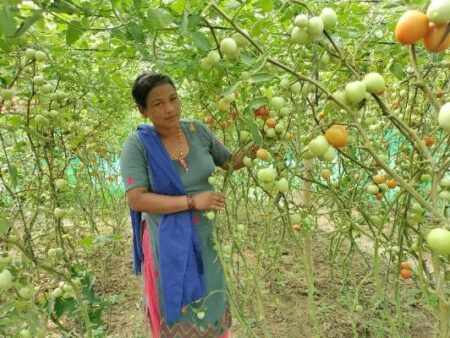
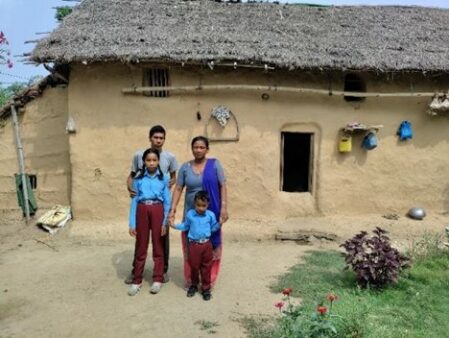
This school year, Kalpana used some of her profits to register her two school-aged children in a private school. “The economic independence I’m gaining from greenhouse farming has made me confident in every aspect,” she says proudly.
Though some programs are designed especially for women, we’ve found that our entrepreneurial graduates often enlist the help of their husbands when launching their new businesses. Not only does this maximize their effectiveness and profits—it creates jobs in the home community, allowing families to build financial success as a team!
OVS Construction: Carpentry
Ashok, 20, grew up in Dolakha District with his family of five. They depend on subsistence farming for their livelihood—an extremely tough lifestyle in mountainous regions.
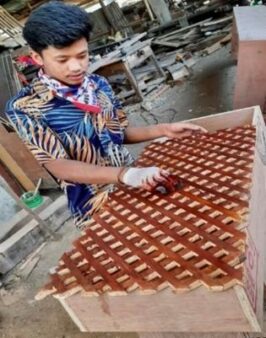
Ashok is a smart, fastidious young man with strong attention to detail. He knew he was capable of providing much more for his family than farming allowed, and he dreamed of living somewhere outside of his village. But without access to training or apprenticeship opportunities, and no money for traveling to a vocational school, he wasn’t sure how to kickstart a new career.
In early 2022, Ashok heard about a career orientation presentation being offered by NYF in a nearby village. Curious, he attended. He was shocked to hear that the program was free for eligible young adults—including travel and room and board during the three-month course!
Ashok submitted an application for the Carpentry Training course and was placed in the March 2022 session on Olgapuri Campus.
After receiving his certification three months later, Ashok worked as a paid apprentice at a large furniture house in Kathmandu. His performance there was so impressive that the employer offered him a full-time job in June. Ashok is making around $225 per month—nearly twice Nepal’s minimum wage. He’s sending much of it home to support his family.
With his highly-valued skills, Ashok has the ability to shift jobs at will without ever leaving Nepal. He considers this NYF training to be the most important milestone of his career to date!
OVS Construction: Plumbing
Reeta*, 25, lives in a hilly region in western Nepal with her husband. One day, while the COVID pandemic was ongoing, Reeta learned that an Olgapuri Vocational School “satellite” plumbing training program was coming to their area. She signed up for the program right away, but her husband wasn’t so sure. He, like many others, considered plumbing to be a man’s job.
When Reeta mentioned this domestic push-back in class, NYF plumbing trainer Sailesh Khatri offered to meet with Reeta’s husband to talk about his concerns. Though Reeta’s husband was uncomfortable at first, he was willing to listen as Sailesh explained the special value of a skilled trade for a woman. Besides, Sailesh added, Reeta was showing a real knack for the work!
Eventually, Reeta’s husband decided to wait and see what happened once Reeta was certified. He didn’t need to wait long before realizing that Reeta and Sailesh were right.
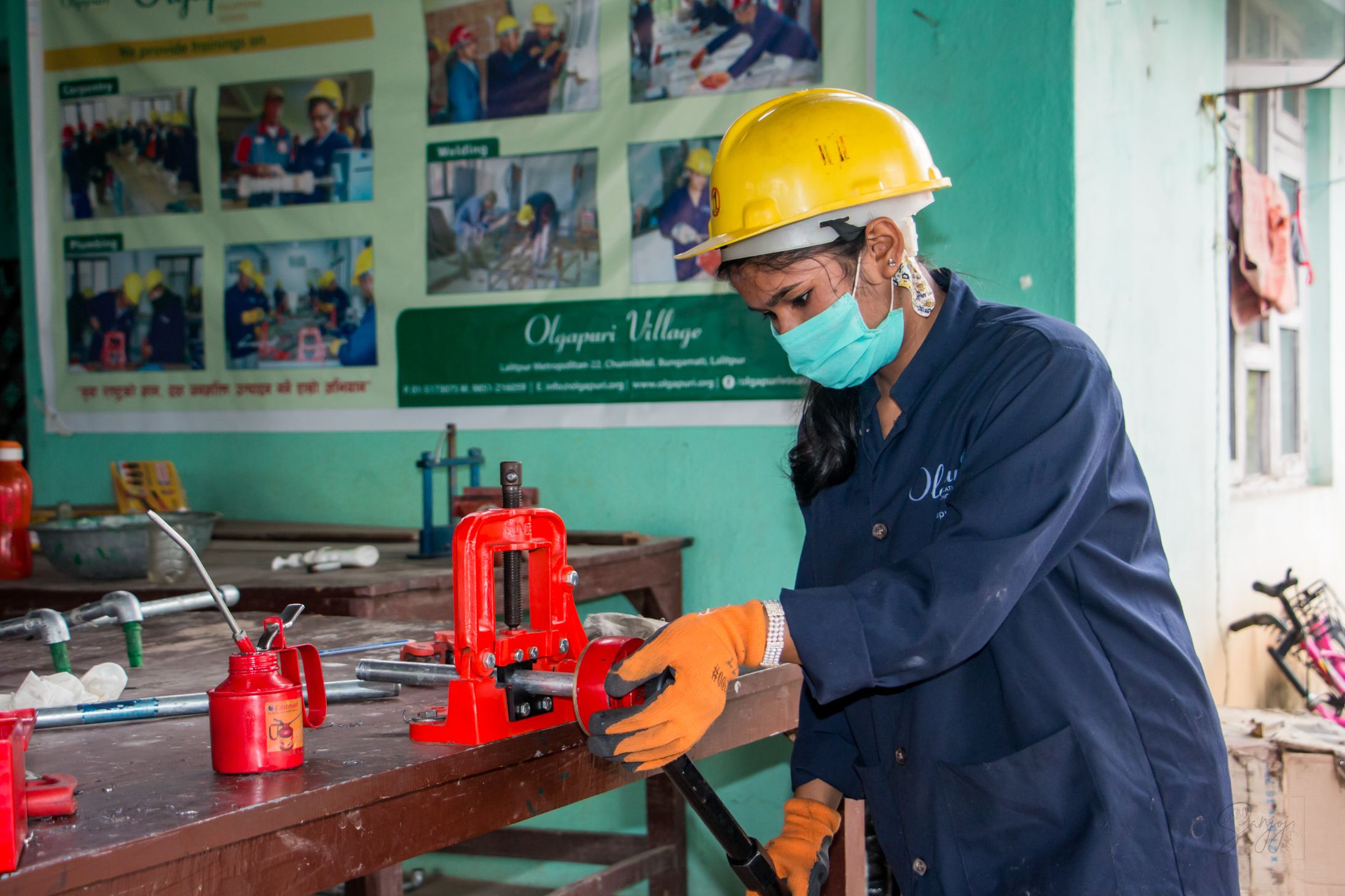
After completing the program in February 2021, Reeta was hired as an on-call technician for a major government project. She is responsible for all the plumbing repair in her village and is paid accordingly!
We’re especially proud of the community-wide impact our plumbing program is having in rural communities. For more on this, check out a story we shared in April 2022.
World Cup Qatar 2022 Highlights Opportunities for Growth
Working grueling overseas migrant jobs isn’t just physically demanding. It’s incredibly lonely. It’s discouraging to build marvelous infrastructure for strangers when family members back home don’t have access to such luxuries. Because of the ways they are treated, migrant workers also often feel isolated, unknown, and even disposable.
When following up with NYF’s young vocational training graduates, many of them report great pride and satisfaction about working within their own communities. Vocational training programs like ours are transforming individual lives. They are also improving entire villages in the process—not only in a physical sense, but in an emotional and psychological sense as well.
Let’s make sure the lessons learned during World Cup Qatar 2022 lead into more empowering opportunities for young adults in Nepal. Your donation today will help us continue offering these incredible courses to young people throughout Nepal.
Learn more about the workers behind World Cup Qatar 2022
- Human Rights Watch – FIFA/Qatar: Migrant Workers Call for Compensation for Abuses
- The Washington Post – Families of migrant workers who died in Qatar are waiting for answers
- The New York Times – The World Cup’s Forgotten Team
- Reuters – In a stadium of their own, migrant workers say their sweat made World Cup happen
- CBS News – Qatar acknowledges “between 400 and 500” workers died preparing for World Cup
- PBS News Hour – Migrant workers recount abuse while building stadiums for World Cup in Qatar
- BBC News – Qatar World Cup: Families seek answers over migrant worker deaths